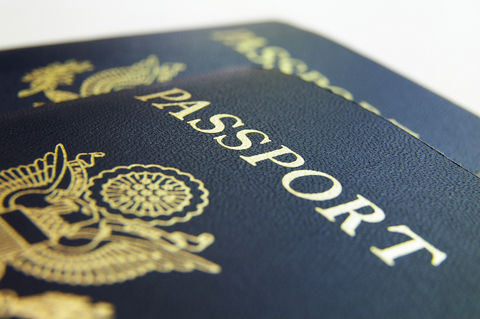
“That would fetch over a million rupees on the black market, you know.”
I glanced up at my friend Satnam in surprise. I was filling out my guest information in the hotel log book while I waited for him to come meet me to go out to dinner. I had been mentally salivating at the thought of an air-conditioned room. ‘Hot’ doesn’t even begin to describe India in the summertime. It’s the kind of heat that has its own weight and presence - you can feel the air push back at you as you try to walk through it. Standing inside the entryway of the guesthouse it felt like the entire room was sweating around me, the very paint on the walls peeling up in thirsty little tongues of sea-foam green.
Satnam’s curious gaze was fixated on the passport, so I offered it to him. He held it in his hands like it was something precious and fragile, his thumbs roving over the golden eagle that stared out so defiantly and unapologetically from the matte blue cover. Gingerly, he opened the book to my picture and looked up at me, studying my features as if to confirm that it was really me in the photo. He cautiously flipped through the pages and read through all the visas and stamps within, echoes of the privileged access to the world that my nationality allows me. I could only guess at what was running through his head just then. He seemed to catch himself for a moment and quickly passed it back to me, flashing me a slightly embarrassed and apologetic smile. I shook my head gently to reassure him, and he took that as his cue to launch into an excited description of the various curries we were going to have at dinner.
That hunger I witnessed in Satnam was reflected in the eyes of nearly everyone I met in India. A question that I was often asked was if we really had poor people in America. When I told them that we did, they would just laugh in disbelief. It was as if in their imaginations our streets are actually paved with gold. But what they don’t understand, what they can’t understand, is that the America of their imagining is not the one they would find upon arrival. For all access to our enviable networks of resources and opportunity is contingent upon having official documentation. To move through our society you need to have proof that you’re allowed to be here. You need a driver’s license or a voter’s registration card, a birth certificate or a social security number, a green card or a certificate of naturalization. Or a passport like the one I held in my hands.
It struck me just then, as I stood there with my little blue passport, mine by right of my birth. It represents so much more than mere citizenship or nationality. It is access to education, health-care, and endless opportunity. It is fluency in the most crucial language in the world. It is inclusion in the most privileged of clubs. And I knew that from that moment on, it was something that I would never again take for granted.
November, 2006
New Delhi, India
Re-edited in June, 2013
Advisor, Writer, Asker of Questions

